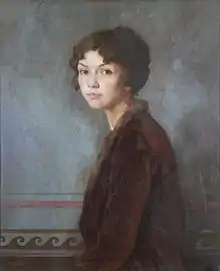Alexandra Kropotkin
Alexandra "Sasha" Kropotkin (1887–1966) was a New York–based writer and Russian language translator. Born in British exile to the Russian scientist and anarchist Peter Kropotkin, the socially prominent family returned to Russia from the 1917 revolution through his death several years later. Upon moving to New York, in her women's column byline she retained the royal honorific ("princess") that her father, a descendant of Kropotkin nobility, had disowned. She translated Russian literature into English and wrote a Russian cookbook that The New York Times considered best-in-class.
Alexandra Kropotkin | |
|---|---|
 Portrait by Gerald Kelly, c. 1922 | |
| Born | April 15, 1887 Bromley, London, England |
| Died | July 4, 1966 (aged 79) New York City, United States |
| Other names | Sasha Kropotkin |
| Occupation(s) | Writer, translator |
Early life and career
Alexandra Petrovna Kropotkin was born on April 15, 1887,[1] in Bromley, London,[2] where her family was living in exile.[3] She was the sole child of anarchist luminary Peter Kropotkin (1842–1921) and was named after his brother, Alexander, who killed himself the year prior.[2] The Kropotkins descend from an early medieval Russian ruler, Rurik,[4] but her father disowned his royal title of "prince" and was, in turn, disowned by his father. In their English exile, the family was socially prominent at the turn of the century and hosted salons on Sundays.[3] Following the 1917 Russian Revolution, they returned to Russia, where Alexandra stayed until 1921.[4] After the death of her father,[3] she settled in New York.[4]
Kropotkin, like her father, cared little for her royal title but used it to establish her American career[3] with the byline "Princess Alexandra Kropotkin". She wrote "To the Ladies!", a regular column in the general interest magazine Liberty[5] from 1931 to 1942.[6] She continued to write on cooking, home economics, etiquette, relationships, and other topics intended for women readers.[5] Her Russian cookbook, How to Cook and Eat in Russian, was reissued by Scribner's in 1964 as The Best of Russian Cooking. The New York Times Book Review considered it the best cookbook on the subject.[7] She also produced an English translation of Crime and Punishment, a revised English edition of The Brothers Karamazov,[8] and Russian translations of several George Bernard Shaw plays.[9]
Personal life
Kropotkin, known as Sasha, promoted her father's legacy but was not an anarchist herself,[2] a subject of disappointment for his followers.[3] She spoke publicly about his memory at the Libertarian Book Club and maintained connection with his social group.[2] At the time of her 1927 arrival in New York, Kropotkin favored the Soviet system and opposed both its communist government and any potential restoration of the czarist order.[4] In the 1964 United States presidential election, Kropotkin supported the conservative Barry Goldwater.[3]
While living in London, Kropotkin had a relationship and brief affair with author W. Somerset Maugham. Several of Maugham's characters are based on her. The two later reunited in Russia when Maugham was on an espionage mission and Kropotkin volunteered as his translator. She introduced Maugham to Alexander Kerensky, attended their weekly dinners, and sometimes hosted at her apartment.[10]
Kropotkin married Boris Lebedev, a young Social Revolutionary Party member, in 1910.[11] They divorced in 1920. While in Russia, Kropotkin met the newspaper journalist Lorimer Hammond, whom she married in August 1927.[12] Her only child, an ambulance nurse, died in London in 1944.[13] Kropotkin died in New York on July 4, 1966.[1][14]
References
- Walter, Nicolas (2014). "Notes to the Text". Memoirs of a Revolutionist. By Kropotkin, Peter. Courier Corporation. p. 539. ISBN 978-0-486-12535-0.
- Avrich, Paul (1995). "Alexandra Kropotkin". Anarchist Voices: An Oral History of Anarchism in America. Princeton: Princeton University Press. pp. 16–17. ISBN 978-0-691-03412-6. OCLC 68772773.
- Dolgoff, Anatole (2016). Left of the Left: My Memories of Sam Dolgoff. AK Press. p. 249. ISBN 978-1-84935-249-9.
- "Russian Princess Comes to Study Us". The New York Times. April 6, 1927. ISSN 0362-4331. Archived from the original on July 4, 2020. Retrieved July 4, 2020.
- Ginsberg, Alan Robert (2016). The Salome Ensemble: Rose Pastor Stokes, Anzia Yezierska, Sonya Levien, and Jetta Goudal. Syracuse University Press. p. 133. ISBN 978-0-8156-5365-3.
- Kim, Linda (June 2014). "'A Woman Sculptor among the Primitive Races'". Frontiers: A Journal of Women Studies. 35 (2): 113fn31. doi:10.5250/fronjwomestud.35.2.0086. ISSN 0160-9009. S2CID 141819470. EBSCOhost 97669008.
- Hazelton, Nika (April 26, 1964). "A Collection for the Kitchen". The New York Times. pp. 34–35. ISSN 0362-4331.
- Classe, Olive (2000). Encyclopedia of Literary Translation Into English: A-L. Vol. 1. Taylor & Francis. p. 366. ISBN 978-1-884964-36-7.
- Gibbs, A M (1990). Shaw. Palgrave Macmillan UK. p. 154. ISBN 978-1-349-05402-2.
- Rogal, Samuel J. (1997). "Kropotkin, Alexandra". A William Somerset Maugham Encyclopedia. Greenwood Publishing Group. p. 120. ISBN 978-0-313-29916-2.
- Walter, Nicolas (2014). "Introduction to the Dover Edition". Memoirs of a Revolutionist. By Kropotkin, Peter. Courier Corporation. p. xv. ISBN 978-0-486-12535-0.
- Foster, Isabel (August 14, 1927). "An Anarchist Prince and His Daughter: Marriage of Lorimer Hammond of New Haven to Alexandra Kropotkin Brings Name of Famous Russian Revolutionist to Connecticut". The Hartford Courant. p. D1. ProQuest 557394080.
- Osofsky, Stephen (1979). Peter Kropotkin. Boston: Twayne Publishers. p. 56. ISBN 978-0-8057-7724-6. OCLC 4497420.
- "Mrs. Lorimer Hammond". The New York Times. July 6, 1966. p. 41. ISSN 0362-4331.